|
|
|
Sort Order |
|
|
|
Items / Page
|
|
|
|
|
|
|
| Srl | Item |
| 1 |
ID:
160461
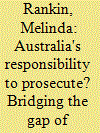

|
|
|
|
|
| Summary/Abstract |
Australia's defence and foreign policy emphasises a rules-based global order—one that includes a responsibility to protect and upholding international criminal and humanitarian law (ICHL).
|
|
|
|
|
|
|
|
|
|
|
|
|
|
|
|
| 2 |
ID:
146671
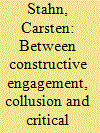

|
|
|
|
|
| Contents |
This article examines the approach and relationship of the ICRC to International Criminal Law. It argues that the International Committee of the Red Cross's (ICRC) position navigates between normative support, collusion and institutional restraint. The ICRC has shaped some of the foundations of contemporary criminal justice, through its early focus on the implementation of International Humanitarian Law (e.g., through implementation and prosecution of “grave breaches”) and its role as “gentle modernizer” of the law. But it has at the same time kept a critical distance towards International Criminal Law. Its approach is marked by three cardinal principles: structural independence, strategic engagement and systemic support. It is grounded in the distinct roles of the ICRC (guardianship, protection, advocacy and dissemination) and deeper structural challenges in the relationship between International Humanitarian Law and International Criminal Law. This contribution argues for a re-conceptualization of some of the existing approaches. It claims that it is unhelpful to theorize on the relationship between the ICRC and International Criminal Courts and Tribunals (ICCTs) on the basis of the premise that International Humanitarian Law provides a set of primary rules that are enforced through criminal institutions, or complemented by secondary rules under International Criminal Law (e.g., war crimes law). It may be more appropriate to view the ICRC and ICCTs as part of a polycentric legal system that is built on a plurality of interactive normative structures and governed by certain checks and balances.
|
|
|
|
|
|
|
|
|
|
|
|
|
|
|
|
| 3 |
ID:
167219
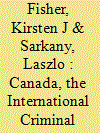

|
|
|
|
|
| Summary/Abstract |
In 2018, Prime Minister Trudeau made two announcements regarding the International Criminal Court, both, it seems, aimed at reinforcing Canada’s claim of human rights promotion and multilateralism: Canada declared Myanmar’s actions against the Rohingya people genocide and urged the United Nations Security Council to refer the situation to the International Criminal Court, and it joined a collective referral of the Venezuela situation to the Court. As public measures of support, these are positive developments for the International Criminal Court, which has been suffering poor public relations and challenges to its legitimacy. However, Canada could do more by better supporting the financial viability of the Court. Currently, it aims to increase the Court’s workload without supporting an increased budget, as reflected in Canada’s involvement at the December 2018 Assembly of States Parties meeting. A seemingly sure way to undermine the International Criminal Court would be to add to its workload without ensuring it has the financial resources to do the work.
|
|
|
|
|
|
|
|
|
|
|
|
|
|
|
|
| 4 |
ID:
116550
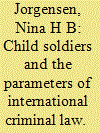

|
|
|
|
|
| Publication |
2012.
|
| Summary/Abstract |
The law on the enlistment, conscription or use of children under the age of 15 to participate actively in hostilities has been addressed in the jurisprudence of the Special Court for Sierra Leone and in the first judgment of the International Criminal Court in the case of Thomas Lubanga Dyilo. This article examines the parameters of the international criminal law relating to child soldiers, focusing on the conduct element of the three modes of committing a child-soldier-related offence. Two main issues are addressed: whether Articles 8(2)(b)(xxvi) and 8(2)(e)(vii) of the 1998 Rome Statute describe two or three separate categories of conduct and whether sexual violence may constitute a form of use in hostilities. These issues are discussed within the framework of the prior evolution of the law and the unfolding practice of the International Criminal Court.
|
|
|
|
|
|
|
|
|
|
|
|
|
|
|
|
| 5 |
ID:
058365
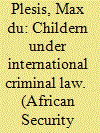

|
|
|
| 6 |
ID:
160198
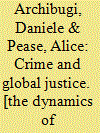

|
|
|
|
|
| Publication |
Cambridge, Polity Press, 2018.
|
| Description |
xxi, 238p.: tables, figurespbk
|
| Standard Number |
9781509512621
|
|
|
|
|
|
|
|
|
|
|
|
Copies: C:1/I:0,R:0,Q:0
Circulation
| Accession# | Call# | Current Location | Status | Policy | Location |
| 059463 | 345.0773/ARC 059463 | Main | On Shelf | General | |
|
|
|
|
| 7 |
ID:
170261
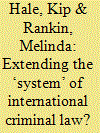

|
|
|
|
|
| Summary/Abstract |
Despite its short life of 16 years, the International Criminal Court (‘ICC’ or ‘Court’) is no stranger to controversy. Indeed, contestation started before the ICC began operations. Throughout the drafting the Rome Statue, the ICC's founding treaty, states such as Germany argued vehemently for the ICC to be granted universal jurisdiction, while the permanent five members of the United Nations Security Council (‘UNSC’ or ‘Council’) remained reticent to relinquish full jurisdiction over the core international crimes (Eikel 2018), including war crimes, crimes against humanity, and genocide (collectively ‘atrocity crimes’). Even after the Rome Statute was passed and the ICC was founded, albeit without universal jurisdiction, it remained embattled. Not only was it criticised for its ineptness at the early stages of its establishment, the Court continued to be condemned for its lack of involvement in global hotspots outside its jurisdiction. For instance, despite being described as the worst humanitarian disaster since the Second World War (Al Hussein 2017), the ICC does not have jurisdiction over alleged atrocity crimes in Syria – namely, because Syria is not a State Party to the Rome Statute, but also because Russia and China as permanent members of the UNSC have blocked attempts to refer it to the ICC.
|
|
|
|
|
|
|
|
|
|
|
|
|
|
|
|
| 8 |
ID:
150997


|
|
|
|
|
| Summary/Abstract |
The contentious concept of ‘lawfare’ has proliferated to various foreign policy areas and permeated a discourse on the function and legitimacy of law in conflict. The concept seems particularly apt to the International Criminal Court’s (ICC) judicial interventions. In this context, I define lawfare as the coercive and strategic element of international criminal justice in which the ICC’s judicial interventions are used as a tool of lawfare for States Parties and the United Nations Security Council to pursue political ends. I argue that there are two types of political ends being pursued with this lawfare: conflict resolution and politicized prosecutions. First, the ICC’s spokespersons, advocates, and supporting states have cultivated a discourse that justice is a means to peace. As a result, the ICC has been used as a means of intervention in ongoing conflicts with the expectation that the indictments, arrests, and trials of elite perpetrators have deterrence and preventive effects for atrocity crimes. Despite these legitimate intentions and great expectations, there is little evidence of the efficacy of justice as a means to peace. Second, the other manifestation of lawfare represents an abuse or manipulation of the ICC for political gain. Specifically, States Parties have strategically referred their conflict situations to the ICC with the expectation that the referral will result in the removal of their rivals and sanction the impunity of ruling elites. This politicization of international justice has been successful in that most of the ICC’s prosecutions are unjustly one sided. Evidence of politicized prosecutions has damaged the ICC’s credibility as an impartial institution and raises questions about the desirability of state referrals. Consequently, the ICC’s efficacy and credibility are suffering from lawfare.
|
|
|
|
|
|
|
|
|
|
|
|
|
|
|
|
| 9 |
ID:
085826
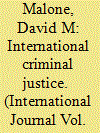

|
|
|
|
|
| Publication |
2008.
|
| Summary/Abstract |
July 2008 produced two major developments relating to international criminal justice, highlighting again the political delicacy of this newly salient dimension of international relations. On 14 July, the prosecutor of the international criminal court sought an arrest warrant against serving Sudanese President Omar al-Bashir for genocide, crimes against humanity, and murder.
|
|
|
|
|
|
|
|
|
|
|
|
|
|
|
|
| 10 |
ID:
155855


|
|
|
|
|
| Summary/Abstract |
This essay outlines the history of international criminal law scholarship in Russia. I use a politically based explanation of the changing positive and negative attitudes regarding international criminal law, and show that the discourse on these issues in contemporary Russia is subject to serious political pressure. Changing such a situation is a difficult but essential task, mainly because of the over-riding need to free current scholarship from political control.
|
|
|
|
|
|
|
|
|
|
|
|
|
|
|
|
| 11 |
ID:
164458
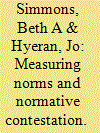

|
|
|
|
|
| Summary/Abstract |
One way to tell if an international norm is robust is to assess the breadth of its support from a wide variety of important actors. We argue that, to assess norm robustness, we should look at the general beliefs, rhetorical support, and actions of both primary and secondary norm addressees (states and nonstate actors) at various levels: international, regional, domestic, and local. By way of example, we evaluate the robustness of international criminal law (ICL) norms by looking at the rhetoric and actions of a diverse set of international actors, including not only states and intergovernmental organizations but also ordinary publics, rebel groups, and nongovernmental organizations. Assessing evidence of norms beyond states leads us to conclude that the core ICL norms are robust, but their practical and institutional applicability are still contested. Contestation over applicability is important, and there are hints that it is growing, at least among some key actors, suggesting the possibility of ICL norm decay.
|
|
|
|
|
|
|
|
|
|
|
|
|
|
|
|
| 12 |
ID:
153846
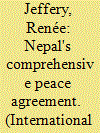

|
|
|
|
|
| Summary/Abstract |
In November 2006, the Government of Nepal and the Communist Party of Nepal-Maoist signed a Comprehensive Peace Agreement (CPA) designed to bring more than a decade of violent conflict to an end. At its heart stood a commitment to ending impunity for the significant number of human rights violations perpetrated during the conflict. In particular, by refusing to grant amnesties to perpetrators of human rights abuses and by agreeing to impartial investigations of alleged human rights crimes, Nepal seemed willing to embrace globally accepted anti-impunity and accountability norms. A decade on, however, impunity for human rights violations continues to prevail in Nepal, while accountability efforts are routinely resisted and even obstructed by members of the ruling elite. With this in mind, this article examines the range of factors that have allowed impunity to prevail over accountability in post-conflict Nepal. It argues that despite the efforts of the international community, civil society actors and local human rights activists to remove impunity guarantees from Nepal's peace agreement, shifting political dynamics, competing interests, and a genuine lack of political will have allowed impunity to flourish in the post-conflict period.
|
|
|
|
|
|
|
|
|
|
|
|
|
|
|
|
| 13 |
ID:
120640
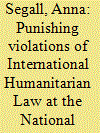

|
|
|
|
|
| Publication |
Geneva, International Committee Of the Red Cross, 2001.
|
| Description |
199p.Pbk
|
| Standard Number |
2881451179
|
|
|
|
|
|
|
|
|
|
|
|
Copies: C:1/I:0,R:0,Q:0
Circulation
| Accession# | Call# | Current Location | Status | Policy | Location |
| 057321 | 341.77/SEG 057321 | Main | On Shelf | General | |
|
|
|
|
| 14 |
ID:
067077


|
|
|
| 15 |
ID:
141486
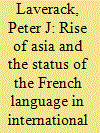

|
|
|
|
|
| Summary/Abstract |
In the last century, French and English became entrenched as the two working languages of international law. Since that time, we have witnessed the rapid development and integration of Asian nations into international systems and the adoption of English as the sole universal language in other fields. This article carries out a cost-benefit analysis concerning the continued use of French in international law, in particular at the tribunals of international criminal law. The aim of this article is to assess whether the current bilingual system is fit for purpose in the 21st century. The mode of analysis is data, first showing the global use of languages today, and then regarding the make-up and workings of international courts, in particular the International Criminal Court. From this data, the author concludes that French is unfit for purpose as a common working language due to the bias that its use creates against Asian and Latin American nations. The author concludes that the only satisfactory solution is the abandonment of French in favour of a system that uses English as the sole common working language.
|
|
|
|
|
|
|
|
|
|
|
|
|
|
|
|
| 16 |
ID:
151762


|
|
|
|
|
| Summary/Abstract |
An enduring dilemma in war is whether and how to punish those responsible for war crimes. In this essay, we analyze the most frequent criticisms made by war crimes trial skeptics, including the claims that such trials endanger prospects for peace by encouraging enemies to continue fighting, that they achieve only “victors’ justice” rather than real justice, and that, in any event, they are unnecessary due to the existence of more effective and less costly alternatives. We conclude, in accordance with a “moderate retributivism,” that when carried out consistently with established law and procedure, and when not dramatically outweighed by concerns that trials will exacerbate ongoing or future conflicts, prosecutions are a legitimate, and sometimes necessary, response to violations of the laws of war and international criminal law more broadly.
|
|
|
|
|
|
|
|
|
|
|
|
|
|
|
|
| 17 |
ID:
089963


|
|
|
|
|
| Publication |
2009.
|
| Summary/Abstract |
In Australia, despite greater public awareness and acknowledgement of the problem by government agencies, trafficking in persons remains a phenomenon poorly understood and researched. The true extent of Australia's human trafficking problem is not fully known, largely due to the clandestine nature of this phenomenon. Anecdotal evidence, media reports, and statistical estimates without proper evidentiary bases are the only sources of information currently available about trafficking in persons in Australia. This article produces a more accurate assessment of the scale of trafficking in persons in the light of the open source evidence, thus contributing to the understanding of the immediate problem, and paving the way for further research on the many facets and aspects associated with trafficking in persons in Australia and elsewhere. The article calls for further research into trafficking and greater openness from relevant stakeholders, in order to clarify the facts about trafficking in Australia, and to help to dispel the myths and misconceptions that abound in discussing this issue.
|
|
|
|
|
|
|
|
|
|
|
|
|
|
|
|
| 18 |
ID:
037924


|
|
|
|
|
| Publication |
London, WeidenFeld and Nicolson, 1980.
|
| Description |
xiii, 226pHardbound
|
| Standard Number |
0297777718
|
|
|
|
|
|
|
|
|
|
|
|
Copies: C:1/I:0,R:0,Q:0
Circulation
| Accession# | Call# | Current Location | Status | Policy | Location |
| 023144 | 364.135/Fenton Bre 023144 | Main | On Shelf | General | |
|
|
|
|
| 19 |
ID:
102273


|
|
|
|
|
|
|
|